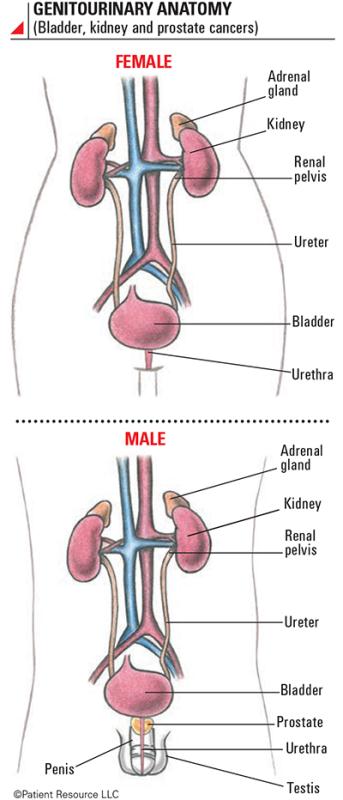Cancer Immunotherapy
Kidney (Renal) Cancer
The kidneys are a pair of bean-shaped organs located in the back of the abdomen. There is one on each side of the spine, and they are protected by the lower ribcage. Each kidney is approximately four to five inches (about 10 to 12 cm) long, which is about the size of a fist.

The kidneys are a part of the urinary tract, and their main function is to filter all of the blood in the body. As the blood in the body passes through the kidneys multiple times each day, the kidneys filter out excess water, salt and waste products. This creates urine, which then travels to the bladder for storage until urination. The kidneys also play a role in controlling blood pressure and making red blood cells.
What is Kidney Cancer?
Kidney cancer begins when abnormal cells in the kidneys start to grow out of control and form one or more masses – or tumors – within the kidneys. Kidney cancer can range from one tumor in one kidney to several tumors in both kidneys.
The kidneys are part of the urinary tract, and their main function is to filter the blood. These two bean-shaped organs are located in the back of the abdomen. There is one on each side of the spine, and they are protected by the lower ribcage. Each kidney is approximately four to five inches (about 10 cm to 12 cm) long, which is about the size of a fist.
All of the blood in the body passes through the kidneys many times each day, and the kidneys filter out excess water, salt and waste products. The end result of this filtering process is urine, which then travels to the bladder, where it’s stored until urination. The kidneys also play a role in controlling blood pressure and making red blood cells.
Renal cell carcinoma (RCC) is the most common type of kidney cancer. RCC has several subtypes, classified mainly by the appearance of the tumor cells under a microscope. The subtypes include clear cell, papillary, chromophobe, transitional cell, collecting duct, renal medullary carcinoma and unclassified. Knowing the subtype can both influence treatment choices and help doctors determine if the cause of the cancer may be related to an inherited genetic syndrome.
Immunotherapy for Kidney Cancer
The approval of immune checkpoint inhibitors has added to the immunotherapy treatments approved for renal cell carcinoma (RCC), which is the most common type of adult kidney cancer (see Genitourinary Anatomy). In many cases, this class of immunotherapy is standard of care for advanced RCC, and some immune checkpoint inhibitors are also considered first-line therapy. The inhibitors currently approved block PD-1, PD-L1 or CTLA-4 (cytotoxic T-lymphocyte-associated protein 4). The FDA has also approved multiple immune checkpoint inhibitor combinations for advanced and metastatic RCC. Combinations with some targeted therapies have also been approved.
You may qualify for first-line treatment with some of the immune checkpoint inhibitors if you have advanced RCC or are classified as intermediate or poor-risk and have not had previous treatment.
This class may also be used as second-line therapy for advanced RCC if you previously received antiangiogenic targeted therapy or your tumors test positive for microsatellite instability-high (MSI-H) or deficient mismatch repair (dMMR), and your tumors progressed after previous treatment and you have few alternative options.
Two cytokines, a type of nonspecific immune stimulator, were the first type of immunotherapy approved for RCC: interleukins and interferons. Although they are not as widely used today as immune checkpoint inhibitors, a type of interferon is still occasionally used in combination with a targeted therapy for metastatic RCC. High-dose interleukin 2 (IL-2) was one of the first immunotherapies approved to treat metastatic RCC. It offered a longer duration of complete remission, but patients are now carefully selected for this treatment because of the high level of side effects.
A monoclonal antibody (mAb) is approved to treat advanced RCC. This conjugated mAb combines an antibody and a chemotherapy, allowing the drug to target specific receptors on a cancer cell and then deliver the chemotherapy directly to it.



